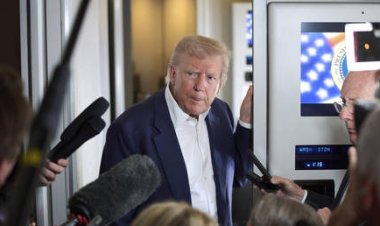From Trump’s immunity to abortion, the Supreme Court’s most controversial decisions this term are about to drop
A POLITICO cheat sheet for what’s still pending on the high court’s docket.


As the Supreme Court rushes to deliver the final decisions of its current term, the justices face a pile-up of cases that are sure to shape the presidential campaign — and could upend the legal landscape in areas from abortion to air pollution to free speech on the internet.
The court is scheduled to issue opinions Wednesday, Thursday and Friday. By far the biggest pending decision is Donald Trump’s bid to be declared immune from federal criminal charges for trying to overturn the 2020 election.
Other cases still left on the court’s docket could curtail access to emergency abortions, shrink the power of federal agencies and boost conservative voices on social media.
The high court’s decisions so far this year — most notably a major gun case decided last week — show signs of some GOP-appointed justices pulling back from doctrinaire conservative positions. But the last decisions each term often prove to be the most contentious and ideologically polarized.
The justices have 14 argued cases left to resolve, and they typically try to complete that work by the end of June. There is a chance, though, that the yearly ritual of momentous rulings could spill into early July.
Here’s POLITICO’s look at the stakes in each of the remaining cases:
Trump v. United States
Trump’s bid for immunity
The blockbuster undecided case of the term could complicate or perhaps even cripple the election-subversion case that Jack Smith has brought against Trump.
Despite what many Trump critics say is an urgent need to bring Trump to trial on the charges before this fall’s election, the Supreme Court hasn’t seemed to be in a huge rush to issue what Justice Neil Gorsuch predicted would be “a decision for the ages.” The question for the justices is under what circumstances — if any — a former president has immunity from criminal prosecution.
The justices’ decision to allow that question to remain unresolved until the end of June has drained some of the drama from the politically red-hot case. Even if the court denies Trump’s bid for blanket immunity and allows the case to proceed in some form, the trial judge’s previous promises of preparation time for Trump’s lawyers make it doubtful the case could go in front of a jury before Election Day. And if Trump wins the election before a trial occurs, he could order the Justice Department to dismiss the charges.
Fischer v. United States
Scope of Jan. 6 charges
This case stems from legal challenges brought by defendants charged with taking part in the Capitol riot on Jan. 6, 2021 — and it could affect the election-focused federal case against Trump, too.
Defense lawyers contend that prosecutors have adopted an overly broad interpretation of a federal law that makes it a crime to obstruct an official proceeding. The charge carries a maximum prison term of 20 years and has been leveled against more than 350 people in connection with Jan. 6.
Two of the four felony charges against Trump in the election case involve the obstruction charge, so if the Supreme Court narrows the interpretation of the statute, Smith may find himself scrambling. He has signaled, though, that he believes the charges against Trump would still stand even under a narrow interpretation.
Moyle v. United States
Emergency abortions
The issue in Moyle is whether hospitals in states with abortion bans are nonetheless required by federal law to perform emergency abortions. Idaho argues that its hospitals shouldn’t be forced to offer abortions under the Emergency Medical Treatment and Labor Act.
The ruling will be the first time the high court weighs in on a state’s abortion ban since the court overturning Roe v. Wade two years ago. It will be the second abortion-related decision of the term, after the court earlier this month rejected a bid to roll back access to the abortion pill mifepristone.
NetChoice v. Paxton and Moody v. NetChoice
Regulation of social media
In another sign of social-media giants’ outsized influence on American society, litigation involving the companies now accounts for an increasing chunk of the Supreme Court’s docket. These two cases involve challenges to laws passed by Republican-led legislatures in Texas and Florida setting rules aimed at preventing companies like Facebook, YouTube and X from squelching the voices of conservatives online.
The cases could pose a conundrum for the court’s six-justice conservative majority. Are those justices so concerned about the platforms’ allegedly biased content-moderation policies that they will approve government intervention to protect conservative commentary? Or will they stick to a more traditional First Amendment approach that would give social-media companies broad latitude to decide what can appear on their platforms?
Murthy v. Missouri
Government pressure on social media
This lawsuit, brought by Missouri and Louisiana and seven individual plaintiffs, alleges that the Biden administration violated the First Amendment by urging social media companies to take down what federal officials said was misinformation about Covid-19, the election and other topics. The plaintiffs contend the administration was trying to silence conservative voices.
Relentless Inc. v. Department of Commerce and Loper Bright Enterprises v. Raimondo
Power of federal agencies
This duo of cases lack the flash and sizzle of some of the others, but their impact on the federal bureaucracy and the power of federal agencies could be sweeping. The suits ostensibly focus on a Commerce Department rule requiring boat operators to pay for monitors to confirm compliance with limits aimed at preserving fish stocks.
However, the real target isn’t fisheries management policies but a four-decade-old legal precedent that has long been a bête noire for legal conservatives: the Chevron doctrine. It requires judges to defer to federal agencies’ interpretations of their own legal authority as long as that take is reasonable, even if judges don’t believe it’s the best one.
Critics say Chevron allows executive branch officials and federal bureaucrats to usurp the role of judges to interpret the law, while backers of the doctrine say it allows experts to make decisions about highly technical regulatory issues courts may struggle to understand. If the high court finally filets Chevron, agencies could lose the flexibility to address new environmental, food, drug and consumer safety dangers in ways industry often complains are too costly.
SEC v. Jarkesy
In-house judges at federal agencies
The conservative crusade against the administrative state marches on at the Supreme Court with this challenge to the power of “in-house” judges at the Securities and Exchange Commission. Opponents of that arrangement say it denies targets of SEC enforcement actions the right to immediately go to traditional federal judges to dispute the agency’s stance.
The Supreme Court has been increasingly receptive to these sorts of constitutional challenges to the structure of longstanding agencies. A ruling against the SEC could jeopardize similar mechanisms used by federal officials who enforce labor protections, antitrust law and consumer finance rules. A more cumbersome enforcement process could mean fewer cases, but longtime critics of agency judges — often known as administrative law judges — say taking all such cases to federal court would be fairer.
Harrington v. Purdue Pharma
Bankruptcy for opioid maker
The Biden administration asked the Supreme Court to block the controversial bankruptcy plan for Purdue Pharma, which faced a torrent of lawsuits for its marketing of an opioid medication that addicted vast numbers of Americans. The justices put the multi-billion-dollar bankruptcy settlement on hold temporarily while they weigh the case, although many victims and states were eager to push forward with the deal. The arrangement would result in the Sackler family giving up control of the bankrupt drugmaker and it would effectively cap the family’s liability at about $6 billion.
That limit and other unusual aspects of the bankruptcy plan have irked some who say they were harmed by the marketing of the pain drug, while others dealing with fallout from the opioid addiction epidemic say those concerns should be put aside to allow the money to begin to flow to those who need it.
Ohio v. EPA
Interstate air pollution
This case involves a challenge by some states to the Environmental Protection Agency’s effort to enforce a provision of the Clean Air Act known as the “good neighbor” provision. That provision is meant to protect downwind states from industrial ozone pollution that originates in upwind states.
City of Grants Pass v. Johnson
Homeless rights
This is a major case involving the rights of people without housing. The justices will decide if it’s unconstitutional for a city to prohibit homeless people from sleeping in public when there are no shelters available. The case arises from a ban on homeless encampments in Grants Pass, Oregon. The outcome will affect how cities and states across the country tackle the nation’s homelessness crisis.
Snyder v. United States
Scope of a federal anti-corruption law
The justices have another opportunity to limit the reach of federal anti-corruption laws in this case. James Snyder, a former mayor of Portage, Indiana, is challenging his conviction for taking $13,000 from a trucking company that won city contracts. The case turns on the vagueness of the word “corruptly” and whether it’s clear enough to potentially apply to millions of people who work for state and local governments subject to the statute because they receive federal funds.
At oral arguments in the case in April, members of the court questioned whether the law could be read even to prohibit the receipt of minor gratuities like a gift card. A Justice Department lawyer said those sorts of cases aren’t typically prosecuted, but that didn’t seem to assuage the concerns of some justices.
Trump isn’t charged under this particular law, but the high court’s parsing of “corruptly” could have fallout in several of the criminal cases he faces because they include charges relying on similar language.
Corner Post, Inc. v. Board of Governors of the Federal Reserve System
Debit card fees
This case pertains to the amount of “interchange fees” retailers are charged when customers use debit cards. A North Dakota convenience store, with the support of various business groups, is challenging a Federal Reserve rule that requires merchants to pay banks 21 cents every time a debit card is swiped. The issue before the justices isn’t about the validity of the rule itself — it’s a technical issue involving the statute of limitations for challenging the rule.












